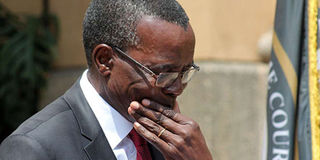Judiciary under siege as woes pile up for Maraga

Chief Justice David Maraga at the Supreme Court on November 4, 2019, where he said his work is being frustrated by some government officials. PHOTO | FILE | NATION MEDIA GROUP
What you need to know:
- In November, Justice Maraga accused the government of crippling the Judiciary’s work by starving it of funds.
- At the Court of Appeal, the court is staring at a crisis with the retirement of three judges last year and the death of Justice Otieno Odek, leaving the court with only 15 judges.
Chief Justice David Maraga is a man under the spotlight as the New Year begins.
That the head of the Judiciary has been under duress is no news. The man confirmed this when he called a press conference and complained bitterly about forces in government that were undermining the institution and his office.
How he navigates the murky waters will determine whether justice will be served and also seen to be served.
On Justice Maraga’s shoulders are the aspirations of many a Kenyan bogged down by never-ending court cases; on his shoulders are hopes that the war on corruption will not flail in the corridors of justice; on his shoulders lie a fractious Supreme Court and Judicial Service Commission (JSC) that are in dire need of leadership.
A looming succession battle in the top court and political interests in the outcomes will come into play this year, not forgetting the stalled appointment of judges.
IMPENDING RETIREMENT
The impending retirement of Supreme Court Judge J.B. Ojwang’ will leave the country’s apex court operating with the bare minimum as the court will only have five sitting judges.
The Constitution stipulates that the Supreme Court is properly constituted, for purposes of its proceedings, if it is composed of five judges.
Justice Ojwang’ is expected to proceed on terminal leave on Sunday, January 5, pending his retirement in February, after attaining the retirement age of 70 years.
With Deputy Chief Justice Philomena Mwilu not sitting because of a case filed against her by Director of Public Prosecutions Noordin Haji, the court is only left with five judges including the CJ himself and Justices Mohamed Ibrahim, Smokin Wanjala, Njoki Ndung’u and Isaac Lenaola.
The move will also intensify the succession battles at the Judiciary and the Supreme Court with Justice Maraga expected to retire next year.
PROGRAMME ALTERED
At the Court of Appeal, the court is staring at a crisis with the retirement of three judges last year and the death of Justice Otieno Odek, leaving the court with only 15 judges.
These include the President of the Court of Appeal, Justice William Ouko, the court’s representative to the JSC, Justice Mohamed Warsame, and the Director of the Judiciary Training Institute (JTI). In effect, the court has only 12 judges who sit full time.
In April 2019, the court suspended its sittings at the Nyeri Court of Appeal because of a shortage of judges.
Following the death of Justice Odek, who was among the three judges sitting in Kisumu, Justice Ouko announced the suspension of decentralised courts in Kisumu and Mombasa.
The judges in Mombasa and Kisumu were ordered to relocate to Nairobi. The affected court stations, including Nyeri, will be served from Nairobi through once-a-month circuit sessions conducted at each station.
The matter was worsened by President Kenyatta’s delay to appoint 41 judges (among them 11 Court of Appeal judges) as recommended by the JSC last year.
COURT CASE
The matter forced Mr Adrian Kamotho, a Nairobi advocate, to move to court to compel President Kenyatta to formally appoint the judges. A bench of three judges will decide the matter on February 6.
The rest of the 41 judges were destined for the Environment and Land court as well as the Employment and Labour Relations court.
Opposing the suit, Head of Public Service Joseph Kinyua said the President could not approve the list of judges sent to him by the commission because some judges had integrity issues.
But the JSC replied, saying any rejection or disapproval of persons proposed for appointment would negate and subvert the independence of the Judiciary.
JSC said the President’s role in the appointment and promotion of judges is purely facilitative.
The JSC also defended the affected judges, saying they have not been given a chance to defend themselves and no specific claims were tabled at the JSC by the National Intelligence Service.
DWINDLING ALLOCATION
In November, Justice Maraga accused the government of crippling the Judiciary’s work by starving it of funds.
“As you all know, many Kenyans come to court to have their disputes resolved and this has resulted in an average of 400,000 cases filed every year.
“With the current manpower, the Judiciary is only able to clear an average of 300,000 cases every year,” Justice Maraga said.
The CJ noted that the Judiciary had been forced to suspend 11 circuit courts of the Court of Appeal because of budget cuts and the shortage of appellate judges.
“We’ve been able to clear 77 per cent of cases older than five years. However, this process will slow down because of lack of funds to implement strategies,” he said.
The CJ, in his address to the nation, warned he would skip certain State functions because he was being undermined by junior officers in government.
That he skipped the last national celebrations of the year, Jamhuri Day, speaks volumes of the battles he faces in 2020.




